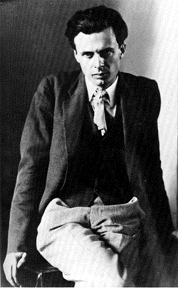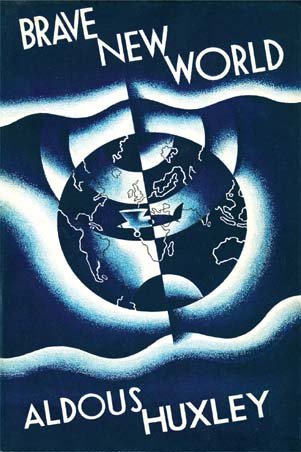Prolific author, philosopher and social critic was born in England and died in Los Angeles, California at the bed of the entertainment industry.

Aldous Huxley wrote almost 50 books, including his most famous "Brave New World" which is a go to novel in the futurology category literally predicted and shaped the rest of the 20th century and into the 21st and absolutely continues to affect us today; not only the paranoid dreams of conspiracy theorists but much more everyday thoughts and opinions from philosophers to the average man.
The Book
It's almost hard to believe the book was published in 1932 with how accurately it depicts many future social customs that have become the norm: Heavy prescription drug use, promiscuity being commonplace, entertainment ever growing and distracting from practical real world issues and, if you pick up this book you will certainly see, many more parallels.

I read this book in high school, rather than the "Nineteen Eighty-Four" book by George Orwell I hear a lot of students were subject to instead. George Orwell's came out in 1949 a good 17 years later than Huxley's masterpiece. Fears of a totalitarian police state for America's future if not the whole world were definitely justified as decades went on with more regulations, more wars, more media propaganda and public distress from loss of freedom were huge and real trends during the 2nd half of the 1900's. But since the 1990's, with the invention of the internet and widespread increase in video games and an ever growing repertoire of entertainment media like film titles, TV shows, even online videos etc., it's becoming more apparently that the distracted "entertained to death" reality predicted in Brave New World is the prevailing outcome when comparing the two examples of what our future could look like. Interestingly, Orwell accussed Huxley of potential plagiraism of his work from an earlier book "We" by Russian author Yevgeny Zamyatin, though this wasn't the only time he was accused of plagiarism which could jsut be because his work was so so world renown - his book was also banned in a number of places.
It's tough to compete with the most famously liked US President in terms of having your death being remembered. Until days ago I didn't realize Aldous had died on the same day as US 35th President John F. Kennedy. We all know that event and even the date is surrounding by theories of occult planned conspiracies to interfere in major world trends to reach what is often called the "elite's agenda." I would not be sure how Aldous' death plays into this besides his death being majorly overshadowed by *JFK's - But why would his death be wanted by any elite NWO plans anyway?
Well a speech he gave at UC Berkeley in 1962, just a year before his death, could reveal some clues. The speech was called "The Ultimate Revolution" where the focus discusses controlling the mind, technology and societal effects of these. He defines a revolution as that which is 'aimed to change the environment in order to change the individual.' Quite a deep and revealing statement to the degree that his main contribution to the world is that of philosophy. Within the first 10 minutes of it he appears to criticize how the state of world governance is by an oligarchy, quite a far cry from what the average theorist would think which is that Huxley was an insider (and very well was) elite and predicted, wanted and even planned the events of the future, laying them out in his famous novel. He admits many of his plot points had already been coming true. If it was so in the past when he wrote it that it was his goal for the future, as part of an elite cabal to manipulate it, perhaps he is having regrets about his contribution to the social changes we saw? It feels like revealing all his thoughts in this speech is like a warning to the public on the dire path we're on. He also seemed to show sympathy for the economic conditions of the poor and how to solve these type of problems and to prevent the abuse of technological advances to the benefit of human beings and not for their degradation.
Vedanta Society and Religious Beliefs
Overshadowed by his literary works is the association he had with the Vedanta Society of Southern California. Their Wikipedia page does not reveal much on what they are and what they believe in, but their YouTube channel is a bit revealing in that respect. A video just released was titled Realizing Non-Duality. It seems to me like a spiritual organization somewhat related to the yogi movement and understanding the essence of reality or consciousness. It was over a decade after Brave New World's release that he wrote the introduction to "Bhagavad Gita: The Song of God" - I personally would not have a guessed a man who could write and predict such a utopian/dystopian future as having anything to do with religion or God.
Personal Life
The Huxley family is a British family of which several members have excelled in science, medicine, arts, and literature. The family also includes members who occupied senior positions in the public service of the United Kingdom.
Huxley married twice, the 2nd time only after his wife Maria died of cancer in 1955. Aldous himself later died of cancer in 1963, as the history books say. Despite writing a literary sensation that would later turn into a motion picture and television adaption, he didn't move to Hollywood until 1937, bringing hi s wife, son and a friend named Gerald Heard. He actually wrote the book while living in Spain. He applied for US citizenship in 1953 but apparently was rejected on philosophical grounds for non-compliance to the requirements. During his life there was also problems with his eyesight though it was claimed he healed that with the Bates mehod which reports to strengthen eye muscles and restore vision, but has not been widely used since the early 1900's.
He had a brother Julian Huxley who outlived him, dying 18 years older. Julian was an evolutionist and the first director of UNESCO, The United Nations Educational, Scientific and Cultural Organization. So both of these Huxley's were involved in social planning and potential manipulation. Julian was an advocate for eugenics, a stance much more common in this era and now seen in mainstream vernacular as regressive, tyrannical and downright evil. He wrote "The Vital Importance of Eugenics" the year after his brother's book; in 1933. He also coined the term "transhumanism." Aldous & Julian can both be labelled predictors if not outright proponents for a future scientific dictatorship.
Future Reading
I would love to read, and would recommend you checkout his updated non-fictional analysis "Brave New world Revisited"
Brave New World Revisited (Harper & Brothers, US, 1958; Chatto & Windus, UK, 1959),[30] written by Huxley almost thirty years after Brave New World, is a non-fiction work in which Huxley considered whether the world had moved toward or away from his vision of the future from the 1930s. He believed when he wrote the original novel that it was a reasonable guess as to where the world might go in the future. In Brave New World Revisited, he concluded that the world was becoming like Brave New World much faster than he originally thought.
P.S.
Here's a nice comparison video between Huxley and Orwell's 2 books:
Congratulations @mikeparker! You have completed some achievement on Steemit and have been rewarded with new badge(s) :
Click on any badge to view your own Board of Honor on SteemitBoard.
For more information about SteemitBoard, click here
If you no longer want to receive notifications, reply to this comment with the word
STOPDownvoting a post can decrease pending rewards and make it less visible. Common reasons:
Submit